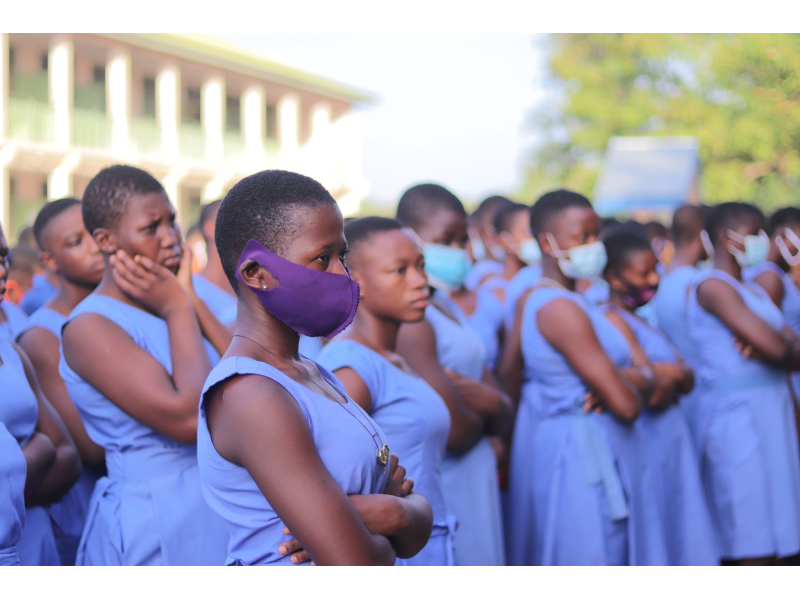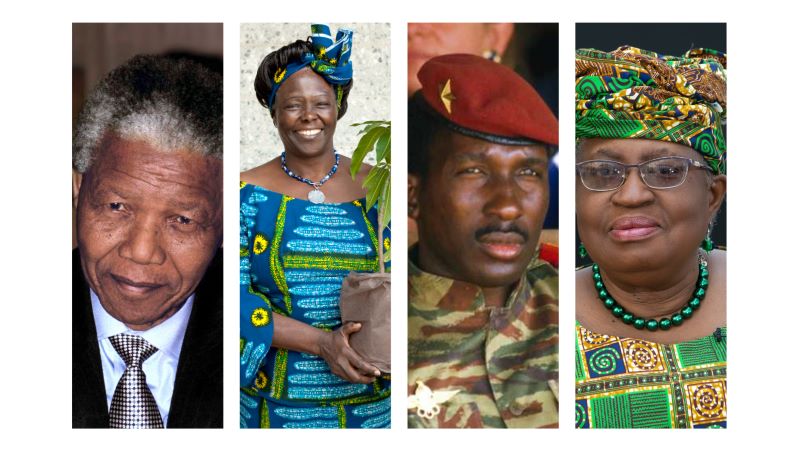On February 24th, 2021, Ghana became the first country in the world to receive the COVAX produced AstraZeneca/Oxford vaccine. The COVAX Facility is an initiative led by the Coalition for Epidemic Preparedness Innovations (CEPI), GAVI, the Vaccine Alliance (GAVI), and the World Health Organization (WHO), in partnership with UNICEF, the World Bank,, and other organizations. This program aims to provide equitable access to low and middle-income countries, and has freely shipped vaccines to countries like Ghana, Côte d’Ivoire, and India.

(Makola market, Accra Central, Accra, Ghana. Image by Muntaka Chasant: https://commons.wikimedia.org/wiki/File:Accra_Central,_Accra,_Ghana.jpg )
Unethical trial testing on people in developing African countries, including the 1999 Pfizer meningitis clinical trial on Nigerian children in Kano, Nigeria, the Aversion Project’s torture and forced gender re-assignments in South Africa during the 1970s-1980s, and a legacy of fake drugs in Africa, may have created a hazy view of modern medicine as it relates to Africa. However, with COVAX’s initiative, a legacy may be shifting.
The International Journal of Economics reported that in the first two months of the COVID pandemic in Ghana, 42,000 civilians lost their jobs. As 80% of the Ghanaian population is reported to work in the informal sector, a sector usually marked by uncertainty, it is unclear whether COVID vaccines will improve the insecurities of informal workers. However, the vaccine itself, which is reported to have a 73% effectiveness rate after 35 days, may help to save civilians’ lives.
FunTimes voyaged to the Accra, Eastern, and Ashanti regions to learn about the impact of the COVID-19 vaccine rollout on the citizens and economy of Ghana.

(Beatrice Andrews, a teacher at KNUST)
Beatrice Andrews is a teacher at Kwame Nkrumah University of Science and Technology Primary School. She received the vaccine in May. In describing her experience taking the COVID vaccine, she says:
“Initially, I was excited but later I had mixed feelings, and wondered about the uncertainties of the vaccine in my system. The side effect of the first jab was terrible for me. The first night after, I felt extremely cold and hot intermittently. Then I became very weak. I actually became better after the 3rd day. But after the second jab, I only noticed a swell at the area I got the jab, and then became hungry at short intervals, which was not a reality for me before I took the jab.”
In describing COVID’s impact on the everyday Ghanaian, Beatrice says:
“COVID has had a great impact on the personal lives of Ghanaians. Before Covid-19, family gatherings and other social activities such as weddings, funerals, naming ceremonies, family reunions, etc, were regular, but most of these activities have either been canceled indefinitely or attendance has been restricted.
On how COVID has impacted her industry: “Covid-19 has greatly impacted our education system. We currently have schools that are run on a shift basis, and learners now do not have that freedom to play around as they used to.”
Beatrice describes Ghanaian’s opinions on the vaccine as “I think some feel the Covid-19 vaccine will help curb the virus, whereas others think there is an ulterior motive behind the vaccine.”
In describing her strategy for avoiding counterfeit pharmaceuticals, Beatrice says: “Sometimes it is very difficult to tell because some of these people producing fake drugs have mastered what they do and are able to replicate the original so well that it sometimes requires a technical expert to tell it is fake. So I try as much as possible to get my drugs from well-accredited pharmacies.”

(Linda Obenewa Oppong, a midwife in the Eastern Region of Ghana)
Linda Obenewa Oppong, a nurse in the Eastern Region of Ghana who has also taken the vaccine, says “The end of the pandemic rests on the successful delivery of COVID-19 vaccines to every county.”
In describing COVID-19’s effect on the healthcare industry in Ghana, Linda says: “Some of us were infected by the virus, and this gave us stress and panic.”
Linda advises people to take the COVID vaccine, and also reminds people to “Continue to wash your hands frequently, wear your nose mask, and avoid over-crowded gatherings.”

(Geraldine Amoah, Accra-based Writer at MyJoyOnline)
Geraldine Amoah is an Accra-based writer at MyJoyOnline. She describes the advice she received from her peers about the vaccine:
“I had people saying it’s the wrong move, it’s a bad idea, and so on and so forth. So much negative energy. But, I also had friends with underlying conditions who were more than eager to take the vaccine. They gave me the extra confidence and security to take the vaccine.”
In recounting her experience taking the AstraZeneca/Oxford Vaccine, Geraldine says:
“For the first dose, it felt as if I had COVID-19. I got a sharp headache a few hours after taking the jab. I experienced the chills and the fever late in the night around 10 pm. I felt the muscle ache the following day. I also had pain at the site of the jab. It swelled up and got hard. So I had to massage it every day with some ointment. The pain went away after about 4 days. The swelling took weeks to go down.
As for the second dose, I didn’t experience any adverse side effects. All I experienced were muscle aches and pain at the site of the jab.”
“I never had any second thoughts or worries about taking the vaccine. I had friends who got COVID-19 and it wasn’t a friendly experience for them. So I was excited to get it. I was relieved when I actually took the jab.
On describing COVID-19’s impact on the everyday Ghanaian, Geraldine says: “COVID affected business, finances, and everything. But people hardly wear face masks these days, so I doubt people are bothered about the disease.”
In describing Ghanaian perceptions of the COVID-19 vaccine, Geraldine says: “Looking at the statistics, it looks like Ghanaians welcomed the vaccine. So far, more than a million Ghanaians have been fully vaccinated. So that’s positive.”
Geraldine describes her strategy for avoiding fake drugs: “If it’s not from the Ministry of Health or a licensed pharmacy, I’m not buying it.”
In encouraging other Ghanaians to take the vaccine, Geraldine says: “It’s a deadly disease. So protect yourself and your family by taking the jab.”

(Afia Bonsu, owner of Adornments by Afia, with her husband, Owusu Bonsu)
Afia Owusu, the owner of Adornments by Afia, is a Philadelphian who travels to and from Ghana regularly. She says “I traveled to Ghana in March 2021. I don’t support the vaccine, as it just came out a few months ago and is basically experimental at this point.”

(Kweku Dodi, international merchant based in Greater Accra, Ghana)
Kweku Dodi, a Ghanaian who frequently travels to the United States, says:
“I have taken the COVID vaccine. I am fully inoculated. I believe it will make it easier for me to travel back and forth, and also protect me against being infected, as the experts have been telling us.
When COVID was first noticed in Ghana in 2020, I was on my way to the United States. Two days after flying out of Ghana’s Kotoka International Airport, the airport was closed to air traffic.
I had planned to be in Virginia for about 6 weeks, but because of the lockdown, I got stuck there. I returned to Ghana on September 25th, almost a month after the airport was reopened for air traffic.
Returning to Ghana imposed extra costs as I was required to take the COVID test prior to boarding my return in the United States, and paying even more money upon arrival in Ghana to confirm a negative result before getting the final clearance to enter the country.
COVID affected my merchandising business big time. There’s a feeling of helplessness that has gripped the people that form my customer base. Sales are down across the spectrum, and businesses are suffering, so I am not surprised that my business has experienced a downturn in revenues.”
Have you taken the COVID vaccine? What country are you in? Comment below!

This article is made possible by funding from Resolve Philly.
Citations
https://www.bbc.com/pidgin/world-56235713
https://www.unicef.org/ghana/press-releases/350000-doses-covid-19-vaccines-have-arrived-ghana
https://www.theguardian.com/world/2011/aug/11/pfizer-nigeria-meningitis-drug-compensation
https://www.emerald.com/insight/content/doi/10.1108/IJSE-08-2020-0582/full/html
http://assets.press.princeton.edu/chapters/i8805.pdf
https://www.bmj.com/content/373/bmj.n1088
https://globaledge.msu.edu/countries/ghana/memo
https://ahrp.org/germanys-colonial-genocide-in-namibia-part-2/
https://www.who.int/news/item/01-03-2021-first-covid-19-covax-vaccine-doses-administered-in-africa
https://www.who.int/news/item/02-03-2021-covax-publishes-first-round-of-allocations
https://www.dw.com/en/covax-worlds-poorest-set-to-receive-first-covid-vaccines/a-56579379
https://www.unicef.org/ghana/press-releases/350000-doses-covid-19-vaccines-have-arrived-ghana
https://globaledge.msu.edu/countries/ghana/memo

Nana Ama Addo is a writer, multimedia strategist, film director and storytelling artist. She graduated with a BA in Africana Studies from the College of Wooster, and has studied at the University of Ghana and Kwame Nkrumah University of Science and Technology. Nana Ama tells stories of entrepreneurship and Ghana repatriation at her brand, Asiedua’s Imprint ( www.asieduasimprint.blog ).





